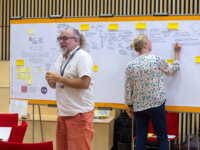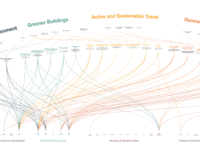AllergyPAL is a dynamic, first of its kind, free training tool which has been designed for SME’s; particularly those operating in hospitality and retail. The concept of creating a novel delivery method assisting business customers improve their understanding of Precautionary Allergen Labelling (PAL) was developed after identifying a key gap in sector standards. AllergyPAL provides users with immersive training through a combination of Point of View (POV) technology and gamification.
Case Study Library
Where innovations are collected and shared to disseminate and replicate good ideas

Innovations:
0
This website, as well as any data and map included herein, are without prejudice to the status of or sovereignty over any territory, to the delimitation of international frontiers and boundaries and to the name of any territory, city or area.
Cyd (pronounced “Keyed”) is the community-led platform for procurement and commercial practitioners across the public sector in Wales.
It’s helping the Welsh public sector to learn from and support each other to implement policy through their day-to-day activities, in line with the Well-being of Future Generations (Wales) Act 2015.
The characteristics of Cyd are: user-centred, design-led, iterative and incremental, collaborative, multidisciplinary, and working in the open - inherently…
Survey figures spoke an alarming truth about a lack of awareness in the public of the risks of the flu and Covid-19, especially when they were circulating at the same time, alongside the essential protection that the vaccines provide. This meant that there was a need for a tool that provided instant access to a trusted voice (the NHS) to cut through misinformation and confusion caused online and to encourage vaccination. The 'NHS Winter Vaccines Virtual Helper' was developed to become that tool.
The UK government launched a new “youth hub” offer of employment services to young people affected by the disruption of the covid-19 pandemic. Through four days of workshops with key stakeholders, which included engaging young people, Impetus ran a theory of change process to enable one of the flagship hubs to co-design their new service to best serve young people. This is the first time that Impetus has applied its theory of change tools, and its impact focus to a government policy…
The UK Government Policy Profession has piloted a new model called Shared Policy Capability Project to support department leaders and policy makers undertake a facilitated self-assessment of their policy environment and identify opportunities for improvement. Through this the government aims to build capability at a department level and enable policymakers to take an active role in improving the environment in which they make policy.
The Local Wealth Building Challenge Fund is designed to provide financial and non-financial support to develop new products and services to tackle challenges. One aspect of this Challenge Fund which is unusual is the focus on developing innovations that will be procured by the challenge holder, providing additional incentives and focus. Public and third sector organizations often have issues that can be solved not by getting new skills or more workers, but by being innovative. The Challenge…
Achieving carbon neutrality requires collective action involving businesses and residents and encouraging them to participate in local governance processes. The most immediate challenge to enable collaboration is to effectively communicate the multiple lines of actions and operational objectives. The Visual Action Plan gives a holistic overview helping public officers to collaborate internally and externally.
The Evaluation Task Force (ETF) ensures evidence and evaluation sits at the heart of UK government spending decisions - any area routinely highlighted for improvement. ETF activity drives continuous improvements in the way programmes are evaluated to inform decisions on whether they should be continued, expanded, modified or stopped. It brings the same approach to the social sciences as medicine uses, fostering a culture of experimentation, learning and rigour.
Case Study
Turning Anticipatory Regulation from Principle to Practice: The Journey of the Regulatory Horizons…
Traditional ways of regulating are not able to keep pace with technological disruption, shifting sectoral boundaries, new types of problems and the opportunities innovation can bring. The Regulatory Horizons Council (RHC) is an independent expert committee set up the UK Government that identifies the implications of technological innovation, and provides government with impartial, expert advice on the regulatory reform required to support its rapid and safe introduction.
Discovery as a Service (DaaS) enables successful delivery of UK Policing Technology through standardised and outcome based discoveries to provide evidence and overcome inconsistency in project initiation. By employing user centric thinking, agile delivery, innovation, and multi-disciplinary teams, DaaS ensures new national technology initiatives provide beneficial capabilities to UK Law Enforcement so they safeguard the UK public. This service is the first of its kind in the Home Office.





